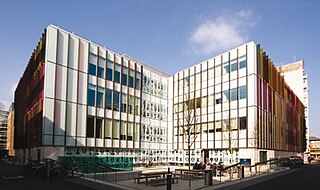Related Research Articles
Biomedicine is a branch of medical science that applies biological and physiological principles to clinical practice. Biomedicine stresses standardized, evidence-based treatment validated through biological research, with treatment administered via formally trained doctors, nurses, and other such licensed practitioners.

Sir David John Weatherall was a British physician and researcher in molecular genetics, haematology, pathology and clinical medicine.

The L'Oréal-UNESCO For Women in Science International Awards, created in 1998, aim to improve the position of women in science by recognizing outstanding women researchers who have contributed to scientific progress. The awards are a result of a partnership between the Foundation of the French company L'Oréal and the United Nations Educational, Scientific and Cultural Organization (UNESCO) and carry a grant of $100,000 USD for each laureate. This award is also known as the L'Oréal-UNESCO Women in Science Awards.

The Department of Biochemistry of Oxford University is located in the Science Area in Oxford, England. It is one of the largest biochemistry departments in Europe. The Biochemistry Department is part of the University of Oxford's Medical Sciences Division, the largest of the university's four academic divisions, which has been ranked first in the world for biomedicine.

The Max Planck Institute (MPI) for Biology of Ageing, founded in 2008, is one of over 80 independent, non-profit-making institutes set up under the umbrella of the Max Planck Society. The overall research aim is to obtain fundamental insights into the aging process and thus to pave the way towards healthier aging in humans. An international research team drawn from almost 40 nations is working to uncover underlying molecular, physiological and evolutionary mechanisms.
Malcolm Andrew Ferguson-Smith, is a British geneticist.
Sir Peter Stanley Harper was a British physician and academic who was University Research Professor (Emeritus) in Human Genetics at Cardiff University. His work focused on researching neurogenetics and has resulted in discoveries concerning muscular dystrophies and Huntington's disease. He was knighted in 2004 for services to medicine.

Biomedical sciences are a set of sciences applying portions of natural science or formal science, or both, to develop knowledge, interventions, or technology that are of use in healthcare or public health. Such disciplines as medical microbiology, clinical virology, clinical epidemiology, genetic epidemiology, and biomedical engineering are medical sciences. In explaining physiological mechanisms operating in pathological processes, however, pathophysiology can be regarded as basic science.
Andrew P. Read is a British medical geneticist.
Dietmar Vestweber is a biochemist and cell biologist. He is the founding director of the Max Planck Institute for Molecular Biomedicine in Münster, Germany.
Shirley Victoria Penrose Hodgson is a British geneticist.
The History of Modern Biomedicine Research Group (HoMBRG) is an academic organisation specialising in recording and publishing the oral history of twentieth and twenty-first century biomedicine. It was established in 1990 as the Wellcome Trust's History of Twentieth Century Medicine Group, and reconstituted in October 2010 as part of the School of History at Queen Mary University of London.

Professor Susan Povey FMedSci, was a British geneticist.
James Scott is a British cardiologist.
Elspeth Bruce Smith FRSE, née Dunkerley, was a British academic and biochemist.
Professor Jane S. Green PhD,, Hon FCCMG, FCAHS is a Canadian medical geneticist.
Bernadette Modell is a British geneticist, specialising in the study of thalassaemia.
Rob Elles is a British molecular geneticist.
Ute Deichmann is an historian of modern life sciences. She is adjunct full professor at Ben-Gurion University of the Negev in Israel, where she was the founding director of the Jacques Loeb Centre for the History and Philosophy of the Sciences in 2007 and continues to be the director. She has also been an associate professor at the University of Cologne, Germany since 2011.
Nagima Abenovna Aitkhozhina was a Kazakh biologist who specialised in the field of molecular biology. She was engaged in the study of the structural and functional organisation of the genome of higher organisms and the molecular mechanisms of regulation of its expression. Aitkhozhina served as general director of the Institute of Molecular Biology and Biochemistry named after M.A. Aitkhozhin of the National Academy of Sciences of the Republic of Kazakhstan from 1990 to 2018, Kazakhstan's first genome laboratory. Between 1999 and 2002, she was president of the Kazakhstan Academy of Sciences. Aitkhozhina was an elected deputy of the Congress of People's Deputies of the Soviet Union from the Committee of Soviet Women from 1989 to 1991. She was decorated with the Order of Parasat in December 2001 and the Order of the Leopard, Third Class ten years later.
References
- 1 2 3 Caroline Overy; Lois Reynolds; Tilli Tansey, eds. (2012). History of the Avon Longitudinal Study of Parents and Children (ALSPAC), c.1980-2000. Wellcome Witnesses to Contemporary Medicine. History of Modern Biomedicine Research Group. ISBN 978-0-902238-78-7. Wikidata Q29581792.